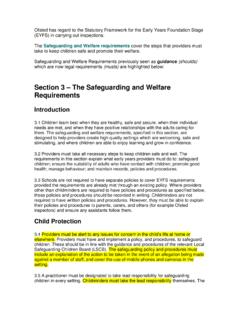Transcription of 15.Safeguarding Adults Investigation Process - Devon
1 safeguarding Adults Investigation Process "A properly co-ordinated joint Investigation will achieve more than a series of separate investigations. It will ensure that evidence is shared, repeat interviewing is avoided and will cause less distress for the person who may have suffered abuse However, no individual agency's statutory responsibility can be delegated to another. Each agency must act in accordance with its duty when it is satisfied that the action is appropriate. Joint Investigation there may be but the shared information flowing from that must be constantly evaluated and reviewed by each agency.". "No Secrets" (page 29). Proceeding to an Investigation If an Investigation is required then the terms of reference for the Investigation /assessment must be jointly agreed at the strategy meeting. This meeting will decide the scope and nature of the Investigation and agree who will lead the Process . If the alleged perpetrator is a member of staff, human resource advisors should be consulted.
2 They should be informed of the progress of the Investigation and where appropriate could be involved in the Investigation , provided their involvement does not compromise any criminal Investigation . If a criminal act is suspected then the police Investigation will take precedence. It is however, important to ensure that the protection of the vulnerable adult(s) is not unduly delayed by their Investigation . Agreement will be required regarding actions to be taken by others while the police Investigation is being carried out. Police action may be supported by care management, health or regulatory staff but if this is not the case, liaison over the progress of the police Investigation should be carried out by the investigating officer. When the police Investigation has been completed other investigations may then be required. Where possible, joint interviews with police should be conducted with vulnerable victims and witnesses to avoid delays and duplication of Investigation activities.
3 Discussions with other professionals will be required to ensure that appropriate support is made available to the vulnerable adult(s) taking into account their cognitive ability, comprehension and communication needs. The purpose of an Investigation is: To establish matters of fact about one or more incident(s) in which abuse is alleged or concerns have been raised. To assess the support and protection needs of the vulnerable adult(s). To determine who was responsible and/or culpable and what action should be recommended in relation to them. To review the management of the setting/service and any improvements required or sanctions to be recommended. Who is responsible for what? Investigations will always be led by one of the statutory agencies. In planning the Investigation it should be clear which agency/individual is taking responsibility for each strand. Interviews with vulnerable victims or vulnerable witnesses should be carried out with the support of appropriate social or health care staff regardless of who has the lead responsibility for the Investigation .
4 The Adult and Community Services, Devon or Torbay Care Trust will take responsibility for overall co-ordination as part of the safeguarding Adults strategy meeting. If the police are not involved the social services agency will take responsibility for A and B. above, for finding out what happened and for taking action to protect the person. If the police are involved they will be fully responsible for any criminal Investigation . Where the alleged abuse has taken place in a regulated service and formal statements are required under the Care Standards Act 2000, the regulatory authorities will take lead responsibility for ensuring that the Investigation is conducted within the requirements of the Act. Where the alleged abuse has taken place in a non-regulated service but one which is contracted, supporting people, day care or work opportunity service, the social services agency should take the lead but be supported by other appropriate professionals. All interviews will be formally recorded.
5 Different agencies may take a lead in relation to perpetrators depending on their position and relationship to the client Family members who are carers may be assessed in terms of their own needs for support as an alternative to sanctions being taken. Other service users will warrant a parallel assessment by the social services agency with possible input from health, police probation, or other agencies. Staff members may require coordinated input by police, personnel, professional bodies, unions or legal services. Employees, service proprietors or managers are more likely to face disciplinary action or actions under the Care Standards Act 2000 or in relation to their professional bodies. Members of the public who abuse will probably be subject to police Investigation . They may also be subject to action by housing authorities, race equality units etc. As they are outside the service or professional frameworks, action through civil or criminal courts may be considered.
6 Where an individual has potentially committed a criminal act they may be investigated by the police with a view to prosecution and this may take place in parallel with, and not instead of, these other actions. The co-ordination role involves sharing information for these different arenas, planning any agreed joint interviews to avoid repeated and distressing rehearsal of the facts, and drawing up a timetable, which acknowledges the different time frames involved in taking these disparate forms of action. Following the allocation of the case by the designated senior officer the investigating officer should start the formal Investigation Process within 48 hours, in conjunction with the other professionals. A timetable should be drawn up indicating the order in which tasks will be undertaken. What are my responsibilities as the Investigating Officer? The investigating officer assigned to co-ordinate the assessment and/or the Investigation will be responsible for: Ensuring that an appropriate alert/referral form has been completed by the professional receiving the initial information.
7 Ensuring the safety of the vulnerable adult(s) in liaison with the Responsible Manager (RM). Ensuring that the wider issues of communication, language, culture, religion and gender are taken into account when planning Investigation /assessment. Ensuring that a complete record of contacts, meetings, phone calls, interviews and decisions is made and kept in the client's file. Carrying out an assessment/ Investigation with other agencies where appropriate and writing a summary of the findings to aid decision-making. Carrying out any other actions identified through the planning, Investigation and assessment Process . A range of investigative actions These might include any or all of the following: Joint visits with other agencies/departments ( police, contracts staff, regulatory authorities). The designated senior officer will support the investigating officer to plan this action or it will be agreed during the formal planning meeting;. Examination of documentary evidence such as files, accident and incident reports, daily logs, accounts, medical records etc.
8 Interviews with witnesses and/or complainants and others who are able to set the scene;. In cases of suspected sexual or physical abuse, a medical assessment should be made available to the individual. In cases where a person cannot give their consent or where consent is questionable, a responsible medical practitioner will have to make a judgment about whether such an examination (either for medical and/or evidential reasons) is likely to be in the person's best interests. Accessing Legal Input on Behalf of the Vulnerable Adult The legislative issues relating to safeguarding Adults is complex and conflicting with the need to balance the issues of autonomy, individual rights and protection. The Law Commission has addressed these concerns in a series of consultative documents culminating in Law Commission Report No. 231 (March 1995) as the basis for law reform. A report Making Decisions (October 1999) outlines the government's approach to incapacity and provides a new legislative framework for substitute decision making.
9 In April 2005 The Mental Capacity Act 2005 received Royal Assent, this will address a wide range of concerns for people who lack capacity when it is implemented in April 2007. Managers are advised to seek specific individual advice from their legal advisors and/or the local police. The responsible managers may seek the support of an independent legal advocate to protect the interests of the vulnerable person where these may run counter to those of the host or purchasing authorities or provider services. Investigation /Assessment Checklist The role of the investigating officer is central to the safeguarding Adults Process . If you are asked to be an investigating officer for a case you should have an understanding of the multi- agency safeguarding Adults policy and protocols and be appropriately trained and experienced to undertake the task. The AIMS for Adult Protection Guide (Pavilion Publishing) contains extensive checklists to support the investigative Process .
10 These can be copied and used to record information or to remind the investigator, in detail, of the issues that may need to be considered. A summary of your responsibilities includes: Completing, as necessary, the alert form and ensuring that it has been input onto the appropriate database. Liaising with the relevant manager if emergency action is required to protect the vulnerable adult(s) or children. Keeping a complete record of contacts, meetings, interviews, phone calls and any decisions taken and issues considered to be placed in the closed section of the client's file. Recording decisions taken as a result of meetings or consultations with other professionals or service providers. Carrying out an assessment/ Investigation with other agencies, where appropriate, and writing a summary of the findings that will support decision making. This checklist may assist you to consider specific issues involved in Investigation and assessment of cases of abuse or suspected abuse: 1 Do you have clear terms of reference for the Investigation /assessment?












